小升初英语情态动词should专项讲解习题
(完整版)情态动词should的用法专项练习
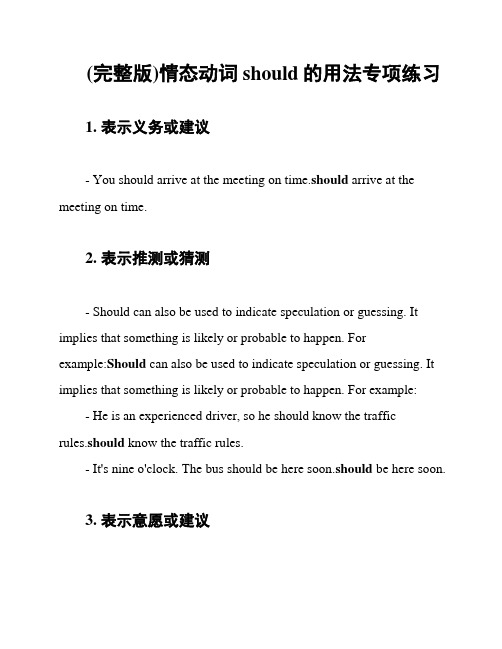
(完整版)情态动词should的用法专项练习1. 表示义务或建议- You should arrive at the meeting on time.should arrive at the meeting on time.2. 表示推测或猜测- Should can also be used to indicate speculation or guessing. It implies that something is likely or probable to happen. Forexample:Should can also be used to indicate speculation or guessing. It implies that something is likely or probable to happen. For example: - He is an experienced driver, so he should know the trafficrules.should know the traffic rules.- It's nine o'clock. The bus should be here soon.should be here soon.3. 表示意愿或建议- I should go to the gym more often.should go to the gym more often.- You should see a doctor if you have a persistent cough.should see a doctor if you have a persistent cough.4. 与条件句连用- If it rains tomorrow, we should stay indoors.should stay indoors.- Should you need any assistance, please don't hesitate to contact us.5. 句型结构- When using should, there are a few sentence structures to keep in mind:should, there are a few sentence structures to keep in mind: - Affirmative: subject + should + base verb should + base verb- You should eat more vegetables.should eat more vegetables.- Negative: subject + should not + base verb / subject + shouldn't + base verb should not + base verb / subject + shouldn't + base verb - You should not waste food.should not waste food.- Children shouldn't play with fire.shouldn't play with fire.- Interrogative: Should + subject + base verb?Should + subject + base verb?- Should I call him back?Should I call him back?6. 注意事项- Avoid using should too frequently in writing. Overuse can make writing seem repetitive. Instead, vary your language by using synonyms like "ought to," "could," or "might".should too frequently in writing. Overuse can make writing seem repetitive. Instead, vary your languageby using synonyms like "ought to," "could," or "might".- The use of should may differ in formal and informal contexts, sobe mindful of the tone and register of your writing.should may differ in formal and informal contexts, so be mindful of the tone and register of your writing.以上是情态动词should的一些常见用法示例。
完整版情态动词SHOULD练习题

完整版情态动词SHOULD练习题1. 以下句子中,哪个是一个合适的情态动词SHOULD的用法?a. 你应该看医生,如果你感觉不舒服。
b. 你应该不喜欢他的老板。
c. 你应该一个人去旅行。
2. 在下面的句子中,哪个是一个不适当的情态动词SHOULD的使用?a. 你应该在考试前好好休息。
b. 你应该买个新手机。
c. 你应该下雨的时候打伞。
3. 下面哪个句子强调了SHOULD这个情态动词的建议?a. 你应该每天运动,这样你会更健康。
b. 你应该多读书,这样你会更聪明。
c. 你应该早点睡觉,这样你会更精神。
4. 以下句子中,哪一个是一个可以代替SHOULD的情态动词?a. 你可以跟我一起去购物。
b. 你可以把这个问题留给明天。
c. 你可以尝试一下这个新餐厅。
5. 在下面的句子中,哪一个是一个正确的情态动词SHOULD 的用法?a. 你应该告诉他你的真实感受。
b. 你应该跟他一起去参加派对。
c. 你应该告诉他你在做什么。
6. 下面哪个句子暗示了SHOULD这个情态动词的义务?a. 你应该拿出一些时间帮助他人。
b. 你应该去旅行,这样你能见识更多。
c. 你应该每天锻炼身体,这样你将更健康。
7. 以下句子中,哪一个是一个合适的情态动词SHOULD的用法?a. 你应该今天晚上过来,我会做美味的晚餐。
b. 你应该别让他等太久。
c. 你应该明天早点到办公室。
答案:1. a2. c3. a4. b5. b6. a7. a。
小学英语情态动词知识点及练习

情态动词【知识要点】:情态动词(Modal verbs)本身有一定的词义, 表示语气的单词。
但是不能独立作谓语, 只能和动词原形一起构成谓语。
情态动词用在行为动词前, 表示说话人对这一动作或状态的看法或主观设想。
情态动词虽然数量不多, 但用途广泛, 主要有下列: can (could), may (might), must, need, ought to, dare (dared), shall (should), will (would) must not.情态动词无人称和数的变化, 情态动词后面跟的动词须用原形, 否定式构成是在情态动词后面加 "not"。
疑问形式是将情态动词提至主语前。
个别情态动词有现在式和过去式两种形式, 过去式用来表达更加客气, 委婉的语气, 时态性不强, 可用于过去, 现在或将来。
情态动词属非及物动词, 故没有被动语态。
【典型例题】:【专题一】:can和could的用法【例1】Can you lift this heavy box?(体力)【解析】表示能力(体力、知识、技能)【练习】1.Mary speak three languages.(知识)2... yo.skate?(技能)此时可用be able to代替。
Can只有一般现在时和一般过去式;而be able to 则有更多的时态。
I’ll not be able to come this afternoon.当表示“经过努力才得以做成功某事”时应用be able to,不能用Can。
【例2】-----Can I go now?----.Yes.yo.can..No.yo.can’t.【解析】表示请求和允许。
此时可与may互换。
在疑问句中还可用could,might 代替,不是过去式,只是语气更委婉,不能用于肯定句和答语中。
【练习】---- I come to see you tomorrow?---.Yes.yo.....----No.yo..../I’.afrai.not.【例3】Can this be true?【解析】表示推测(惊讶、怀疑、不相信的态度),用于疑问句、否定句和感叹句中。
小升初英语专项-情态动词

小升初专项提优精品试题情态动词一,选择方框内的情态动词并用其适当形式填空1.-I have an apple pie, please? -OK. Here you are.2. Look at the sign. It says the museum closes at 5: 00. We leave now.3. -Must I arrive here at 7:00 tomorrow?-No, you It's too early.4. Look at the sign. We start campfires here.5. Time is up. You stop writing now, children.6.- we go to see a film this Friday?-That sounds great.7. -Does your friend walk there?-I'm not sure. He drive there.8. -Have you decided where to spend your summer holiday?-Not yet. We go to Hong Kong.9. You have already tried your best, so you don't to worry too much about the exams.10. Which club you like to join, football club or chess club?二、选择填空。
( )1.- I take a look at the menu?-Sure. Here you are.A. MayB. ShouldC. Shall( )2. You always finish your work on time, Jason.A. CanB. ShouldC. need( )3. This book _____Tom's. I can see Anna's name on it.A. might beB. may beC. can't be( )4.- I borrow your crayons?-OK. Here you are.A. MustB. MayC. Need( )5. - Bob, shall we go to see a film today?-Sorry, I'm afraid I can't. You ask Peter.A. NeedB. mayC. must( )6. -Have you decided what to do tomorrow?-Not yet. We go fishing tomorrow.A. MayB. shouldC. must( )7. -What birds do? -They can't swim.A. CanB. can'tC. must( )8. Boys and girls, you not play with fire. It is dangerous.A. MustB. mayC. can( )9. You brush your teeth twice every day.A. NeedB. shouldC. may( )10. - Dad, can I go to the party tonight?-Sure, but you come back home before 9 o'clock.A. CanB. mustC. may三、按要求改写句子,每格限一词。
情态动词shall,should,_must_用法及练习
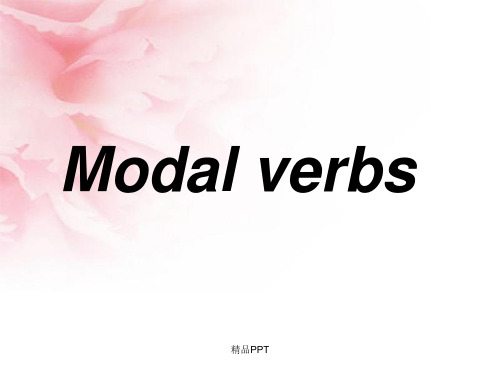
精品PPT
• ---Hi, Tom. Any idea where Jane is?
• ---She _____ in the classroom. I saw her there just now.
A shall be B should have been C must be D might have been
• I’m glad that his son should have won the first prize.
• It’s strange that he should fail again.
• You can’t imagine that a wellbehaved gentleman ___ be so rude to a lady.
• 2. If you must break the law, of course, you will be punished.
精品PPT
• 1. Trees are good for man. We can’t plant them _____ many.
• A so B such
• C too D enough
• 2. In a rely race, a player can’t run fast _____.
• A so B such
• C too D enough
精品PPT
• 2) The glasses should be enough for each guest.
• 3) We should arrive before dark.
• 4) The roads should be less crowded today精.品PPT
should用法归纳及练习

should用法归纳及练习s h o u l d用法归纳及练习一、Should表示过去将来时,即从过去观点看将来要发生的事,多用于间接引语中。
Wethoughtthatweshouldneverseeyouagain.我们想我们再也看不到你了。
TheBBCweatherreportthismorningsaidthatweshouldhaverai n.今天早上,BBC电台天气报告说,今天有雨。
二、Should表示义务、责任、常译为“应当”,“应该”,或表示一种估计的情况,译成“按理应当”,“估计......”。
WhyshouldIpayhim为什么我该付给他钱Theyshouldbetherebynow,Ithink.我估计,他们现在到那儿了。
Should用于完成时态,表示对过去发生的动作的一种推测,译成“应该已经......”。
Youshouldhavewashedthewood.(Butyouhaven‘t.)你应该把伤口清洗了。
(然而你没有)三、在某些从句中,should表示惊异、意外等情绪,常译为“竟然”。
Itseemsunfairthatthisshouldhappentome.真不公平,这件事竟然发生在我身上。
四、当陈述部分含有oughtto,其反意疑问句部分,美国英语中用should.Sheoughttostayhere,shouldn'ther她该留在这儿,是吗五、用于成语中Ishouldliketo......“我想(做)......”Ishouldliketoasktheteacheraquestion.我想问老师一个问题。
六、"should(not)+have+过去分词(done)"对已发生的事表示遗憾或责备,表达"本该或不该"之意。
如:①Healsolearnsthatheshouldhavecaredmoreabouthisfriends.他还明白了他本应该多关心朋友。
should用法归纳及练习
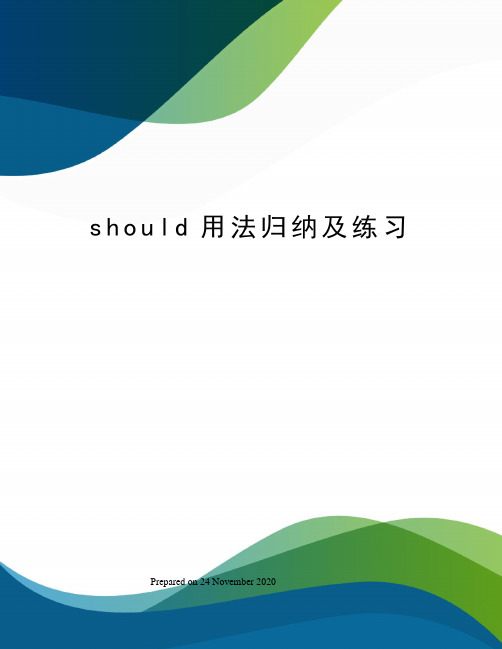
s h o u l d用法归纳及练习 Prepared on 24 November 2020should用法归纳及练习一、Should 表示过去将来时,即从过去观点看将来要发生的事,多用于间接引语中。
We thought that we should never see you again. 我们想我们再也看不到你了。
The BBC weather report this morning said that we should have rain.今天早上,BBC电台天气报告说,今天有雨。
二、Should 表示义务、责任、常译为“应当”,“应该”,或表示一种估计的情况,译成“按理应当”,“估计......”。
Why should I pay him 为什么我该付给他钱They should be there by now, I think. 我估计,他们现在到那儿了。
Should 用于完成时态,表示对过去发生的动作的一种推测,译成“应该已经......”。
You should have washed the wood. (But you haven‘t.) 你应该把伤口清洗了。
(然而你没有)三、在某些从句中,should 表示惊异、意外等情绪,常译为“竟然”。
It seems unfair that this should happen to me.真不公平,这件事竟然发生在我身上。
四、当陈述部分含有ought to ,其反意疑问句部分,美国英语中用should .She ought to stay here, shouldn't her她该留在这儿,是吗五、用于成语中I should like to......“我想(做)......”I should like to ask the teacher a question. 我想问老师一个问题。
六、"should (not) +have+过去分词(done)" 对已发生的事表示遗憾或责备,表达"本该或不该"之意。
小升初英语情态动词should专项讲解习题

小升初英语情态动词——shouldShould表示"劝告"、 "建议 "时这时should常译作 "应当"。
如:We Should learn about the computer and make full use of it.我们应该了解计算机并加以充分利用。
You should listen to the doctor's advice.你应当听大夫的话。
You should study the article care fully. 你应当细,心学习这篇文章。
should还可以表示 "预测"、"可能"They should be here by now.他们现在可能到了。
The reference book should be in the reading-room.这本参考书可能在阅览室里。
should有时表示说话人的感情如惊奇、愤怒、失望等Why should I go? 我干吗要去?(不满)I am sorry that he Should be so obstinate.我很遗憾,他竟这样固执。
(失望)It's strange that it should be so hot today.很怪,今天怎么这么热。
(惊奇)should后跟动词的完成式时这时句子指的是过去的事情。
如果是肯定句,常说明某件事本应完成而未完成;如果是否定句,表示发生了不应当发生的事情。
如:You should have stopped at in red light. 你见了红灯本应该停车。
You Should not have gone back to work without the doctor's permission.你不应当未经医生许可就回去工作。
He Should have come earlier. 他应早一点来。
完整word版小学初中英语情态动词详细用法归纳含练习及答案,文档
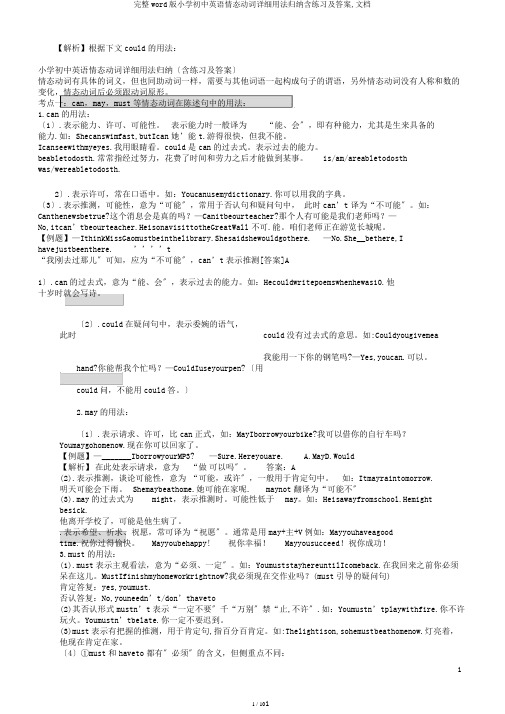
【解析】根据下文could的用法:小学初中英语情态动词详细用法归纳〔含练习及答案〕情态动词有具体的词义,但也同助动词一样,需要与其他词语一起构成句子的谓语,另外情态动词没有人称和数的变化,情态动词后必须跟动词原形。
考点一:can,may,must 等情态动词在陈述句中的用法:1.can的用法:〔1〕.表示能力、许可、可能性。
表示能力时一般译为“能、会〞,即有种能力,尤其是生来具备的能力.如:Shecanswimfast,butIcan 她’能t.游得很快,但我不能。
Icanseewithmyeyes.我用眼睛看。
could是can的过去式。
表示过去的能力。
beabletodosth.常常指经过努力,花费了时间和劳力之后才能做到某事。
is/am/areabletodosthwas/wereabletodosth.2〕.表示许可,常在口语中。
如:Youcanusemydictionary.你可以用我的字典。
〔3〕.表示推测,可能性,意为“可能〞,常用于否认句和疑问句中,此时can’t译为“不可能〞。
如:Canthenewsbetrue?这个消息会是真的吗?—Canitbeourteacher?那个人有可能是我们老师吗?—No,itcan’tbeourteacher.HeisonavisittotheGreatWall不可.能。
咱们老师正在游览长城呢。
【例题】—IthinkMissGaomustbeinthelibrary.Shesaidshewouldgothere. —No.She__bethere,I havejustbeenthere. ’’’’t“我刚去过那儿〞可知,应为“不可能〞,can’t表示推测[答案]A1〕.can的过去式,意为“能、会〞,表示过去的能力。
如:Hecouldwritepoemswhenhewas10.他十岁时就会写诗。
〔2〕.could在疑问句中,表示委婉的语气,此时could没有过去式的意思。
小升初英语情态动词专题讲解及练习

小升初英语情态动词专题讲解及练习小升初英语必考点——情态动词:情态动词有词义,但不能单独作谓语,必须和其他动词一起构成谓语。
情态动词没有人称和数的变化,后面必须跟动词原形。
一、情态动词的种类:小学阶段需掌握can (could)、must、have to、shall (should)、will (would)等情态动词。
二、情态动词的用法:1.can (could):表示能力(体力、知识、技能)。
I can sing。
→ I have XXX.He can draw pictures。
→ He has the XXX.也可表示请求和允许。
Can you help me。
→ Could you help me。
please。
Yes。
of course。
/ XXX.Can you tell me the way to the Zoo。
→ Could you tell me the way to the Zoo。
please?2.must、have to:表示必须、必要。
We must help each other。
→ It is necessary for us to help each other.My sister is ill。
I have to look after her。
→ I am obliged to look after her because she is XXX.注意:must的否定形式XXX’t表示禁止,意思是“不能,不许”。
在回答由must引起的疑问句时,如果是否定的,不能用mustn’t(禁止,不准),而用needn’t、don’t have to(不必要)。
Must I do homework now?肯定:Yes。
you must.否定:No。
you don’t have to / you needn’t.3.should:表示劝告、建议等。
I should finish my homework before watching TV。
六年级下册英语讲义-小升初语法复习: 情态动词 6(含答案)全国通用
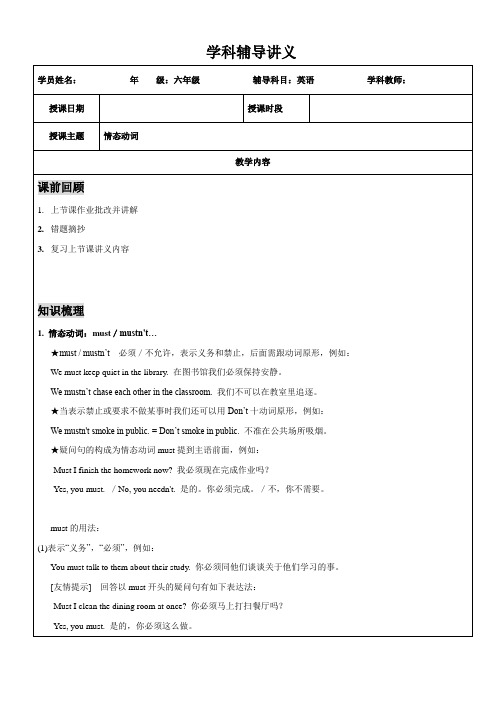
学科辅导讲义I will have to finish the work tomorrow.我明天必须完成这项工作。
(3)否定形式don't/doesn't have to表示“不必”,而mustn't则表示“不应该;禁止”。
e. g. You don't have to wait for me.你不必等我。
We mustn't cut in line.我们不应该插队。
7.情态动词should①表示义务,意为“应该;应当;最好”,比must委婉e. g. You should apologize to him.你应该向他道歉。
You should not eat so greedily.你不应该如此贪吃。
My teacher said (that)I should study harder.老师说我应该更加用功地读书。
②与疑问词连用,表示意外、纳闷、惊讶等,意为“究竟是……;到底是……”e. g. Why should you think that way? 你到底为什么会那么想呢?How should I know? 我怎么会知道?8.情态动词:need1. need是一个特殊的情态动词,意为“需要”。
它不仅能作为情态动词使用,还能充当一个实义动词。
如:Need I do my homework now?我必须现在做家庭作业吗?What do you need?你需要什么?2. need用作行为动词时,用法与其它行为动词相同。
如:You don't need to finish it right now.你不用现在就完成它。
We need to have a break.我们需要休息。
Do they need to know this?他们需要知道吗?3. need作为情态动词时,其过去式为need。
但need作为实义动词时,其过去式为needed.如:I'm sorry I need answer a phone call.So I couldn't talk with you yesterday.抱歉我昨天要听电话,没能跟你好好谈谈。
小升初英语情态动词专题讲解及练习

小升初英语必考点情态动词:情态动词有词义,但它不能单独作谓语,它必须和其他动词一起构成谓语。
情态动词没有人称和数的变化;它的后面必须跟动词原形。
一、情态动词的种类:情态动词有can (could), must, have to, shall (should), will (would)等,这些是小学阶段需掌握的情态动词。
二、情态动词的用法:注意:can not=can’t could not=couldn’t1) 表示能力(体力、知识、技能)。
I can sing.我会唱歌。
He can draw pictures.他会画画。
2) 表示请求和允许。
Could \Can you help me? 你能帮助我吗?---- Yes, of course.\Certainly.\ Sure.Could \Can you tell me the way to the Zoo? 你能告诉我去动物园的路吗?1) must表示必须、必要, 带有命令强制口气;而have to表示不得不,很勉强,强调客观需要。
We must help each other.我们必须互相帮助。
My sister is ill,I have to look after her.我的妹妹病了,我必须要照顾她。
注意:must的否定形式mustn’t表示禁止,意思是“不能,不许”。
在回答由must引起的疑问句时,如果是否定的,不能用mustn’t(禁止,不准),而用needn’t, don’t have to(不必要)。
— Must I do homework now ?—肯定:Yes, you must.否定:No, you don’t have to / you needn’t.应该”,表示劝告、建议等。
注意:should not=shouldn'tI should finish my homework before watching TV.我应该看电视之前完成作业。
情态动词should,shouldn't用法练习答案解析

情态动词should/shouldn't1. We ______ give our seats to old people when we are on a bus.A. shouldB. mayC. canD. could参考答案:A本题考查should的用法。
should意思是“应该”,该句的意思是“当我们在公交车上的时候,我们应该给老人让座”,故正确答案为A。
2.Schools ______ allow students at least one hour a day for sports.A. wouldB. mightC. shouldD. could参考答案:C本题考查should的用法。
该句的意思是“学校每天应该至少给学生一个小时的运动时间”,故正确答案为C。
3. We ______ listen to our friends and give them advice when they’re in trouble.A. canB. mustC. mayD. should参考答案:D本题考查should的用法。
该句的意思是“当我们的朋友有麻烦时,我们应该倾听并且给他们建议”,故正确答案为D。
4. 用括号中所给单词的适当形式完成句子。
We should ______ the new traffic law. (keep)参考答案:keep本题考查should的用法。
should是情态动词,后面要用动词原形,故该空应填keep。
5. Every one of us should ______ for the environment.A. responsibleB. be responsibleC. to be responsibleD. not be responsible参考答案:Bshould后面要加动词原形,而responsible是形容词,另外根据句意应该是“我们每个人应该对环境负责”,故正确答案为B。
第17练 情态动词should的用法(解析版)
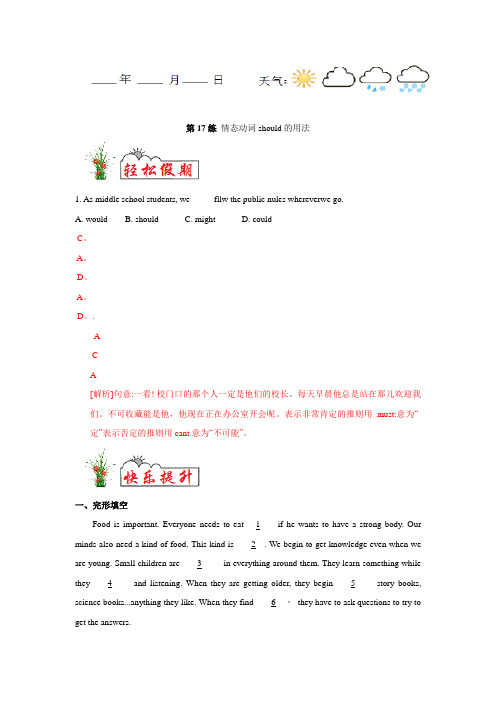
第17练情态动词should的用法1. As middle school students, we_____ fllw the public nules whereverwe go.A. wouldB. shouldC. mightD. couldC。
A。
D。
A。
D。
.ACA[解析]句意:一看! 校门口的那个人一定是他们的校长。
每天早晨他总是站在那儿欢迎我们。
不可收藏能是他,他现在正在办公室开会呢。
表示非常肯定的推则用must:意为“-定”表示否定的推则用cant意为“不可能”。
一、完形填空Food is important. Everyone needs to eat __1__ if he wants to have a strong body. Our minds also need a kind of food. This kind is __2__. We begin to get knowledge even when we are young. Small children are __3__ in everything around them. They learn something while they __4__ and listening. When they are getting older, they begin __5__ story books, science books...anything they like. When they find __6__,they have to ask questions to try to get the answers.What is the best __7__ to get knowledge? If we learn by ourselves, we __8__ the most knowledge. __9__ we are always getting answers from __10__ and don't ask why, we'll never learn more or understand better.()1. A. good B. nice C. well()2. A. knowledge B. meet C. sport()3. A. interesting B. interested C. weak()4. A. watch B. watching C. are watching()5. A. to look B. to learn C. to read()6. A. anything new B. something new C. new something()7. A. school B. way C. place()8. A. get B. getting C. will get()9. A. If B. Where C. What()10. A. other B. others C. another【文章大意】本文是一篇说明文。
2020小升初英语情态动词详解及练习
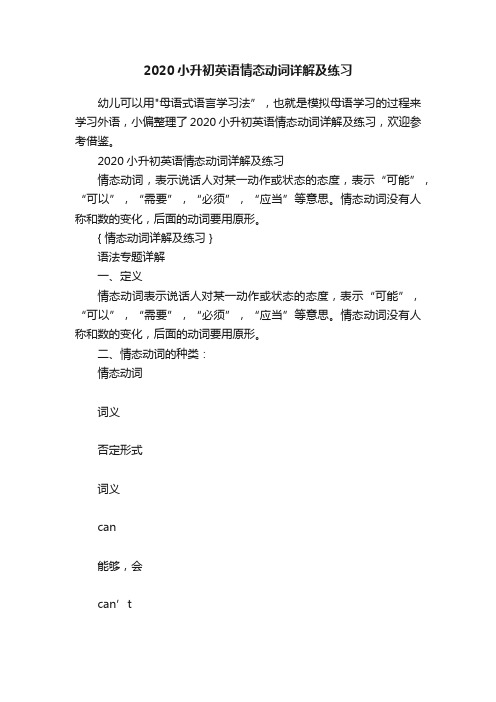
2020小升初英语情态动词详解及练习幼儿可以用"母语式语言学习法”,也就是模拟母语学习的过程来学习外语,小偏整理了2020小升初英语情态动词详解及练习,欢迎参考借鉴。
2020小升初英语情态动词详解及练习情态动词,表示说话人对某一动作或状态的态度,表示“可能”,“可以”,“需要”,“必须”,“应当”等意思。
情态动词没有人称和数的变化,后面的动词要用原形。
{ 情态动词详解及练习 }语法专题详解一、定义情态动词表示说话人对某一动作或状态的态度,表示“可能”,“可以”,“需要”,“必须”,“应当”等意思。
情态动词没有人称和数的变化,后面的动词要用原形。
二、情态动词的种类:情态动词词义否定形式词义can能够,会can’t不能,不会could能够,会couldn’t 不能,不会may可以//must必须mustn’t不允许,不能shall将,要//should应该shouldn’t不应该need需要needn’t不必would将会,愿wouldn’t不会,不愿三、情态动词的常见用法:1.can和could的用法(1)can/could 表示“能力;许可;可能性”等。
could 为 can 的过去式。
如:Can I use your book?我可以用你的书吗?(2)can 用在疑问句中,表示征求意见、请求许可,答语仍用can; could 用在疑问句中,比can 更委婉、客气,是一种礼貌的说法,并不表示过去时态,答语用can,而不能用could。
Eg: -Could you tell me the way to the park?你能告诉我去公园的路吗?-Sorry. I can't. I'm new here。
不好意思,我不知道。
我是新来的。
[注意]①can 和could 只能用于现在时和过去时两种时态。
②另外, can't 可表示否定推测。
2.may和might的用法may/might 意为“可以”,表示同意、许可或请求对方许可,也可表示祝愿。
小升初情态动词专项练习(试题)-英语六年级下册

小升初情态动词专项练习一、选择题1)Lily should her clothes.A. washB. washingC. washedD. washes 2)My sister would some songs for us.A. singsB. singingC. sangD. to sing 3)Would you me a red apple?A. givingB. givesC. givenD. give4)Shall we now?A. goB. goingC. goesD. to go5)you like a cup of coffee?A. WouldB. WillC. DoesD. Do6)- Must I speak English?- No, I .A. mustn'tB. needn’tC. couldn'tD. can’t 7)They see me on Sunday .A. mustB. mayC. shouldD. would8)I use your phone?A. MustB. MightC. MayD. should9)The girls play basketball in the classroom.A. shouldn’tB. couldC. mustD. mustn't 10)She Play the piano very well.A. canB. wouldC. mustn’tD. will11)Can I TV after dinner?A. watchB. watchesC. watchingD. watched 12)It is raining. I leave now.A. couldB. mustC. mayD. will13)He come to the party.A. may beB. wouldn’t likeC. mayD. not should 14)Excuse me, you tell me how to get to the nearest supermarket?A. couldB. mustC. shouldn’tD.have15)________ you like to go skating with me?A. mustB. wouldC. mayD. shall二、改写句子。
小学英语小升初专题训练-词法专项练习:情态动词 50题(含答案)

小学英语小升初专题训练-词法专项练习:情态动词一、单选题(共34题;共68分)1."You ________ kill Snow White," said the queen.A. mustB. couldC. can2.We should ________ too many trees.A. stop cutting downB. stop cut downC. stopping cut down3.You shouldn't the trash in the woods after the picnic.A. leaveB. leftC. want4._________ you please give me a glass of juice?A. CanB. CouldC. May5.Shanghai is _________ a big city in China.A. mustB. reallyC. can6._________ I have some juice?A. WouldB. CanC. May7.Hello, _________ I speak to my mother?A. mayB. whyC. how8.We be quiet in the classroom.A. shouldB. shouldn'tC. can't9.When you feel angry, you should __________________ a deep breath and count to ten.A. doB. takesC. take10.What can you ______?A. doB. doesC. doing11.Hurry up! I can't _________ the balloons.A. holdB. heldC. holding12.The kite can ________ high in the sky.A. flyB. flyingC. flies13.Mike couldn't swimming before.A. goB. goesC. went14.Could you _______ stars at night?A. seeB. sawC. sea15.Can you _______ the dog's barking?A. listenB. listeningC. hear16.We should _______________ hard and _______________ healthy.A. studies; staysB. studying; stayingC. study; stay17.__________wood, we _________cut down too many trees.A. Save; shouldn'tB. To save; shouldn'tC. To save; should18._________ you please give me a pencil?A. CanB. CouldC. May19.Can you my pen friend?A. beB. to beC. being20.We should not on the grass.A. walkingB. to walkC. walk21.—_________ you like some juice?—No, thanks.A. CanB. WouldC. Could22.Trees are good for us. We _________ take good care of them.A. couldB. mayC. should23.— _________ I hand in my homework this afternoon?—No, you _________. You can hand it in tomorrow,A. Must, mustn'tB. May, can'tC. Must, needn't24.Louis ________ run, but he ________ swim in the river. He is only 5.A. can; can'tB. can't; can'tC. can; can25.He was three then. He______________ talk. He______________ swim.A. can; canB. can't; couldn'tC. could; couldn't26.You______________ be late. You______________ work hard.A. should: shouldB. should; shouldn'tC. shouldn't; should27.You______________ take the books down.A. shouldB. shouldn'tC. could angry now!28.The girl______________ walk then.A. canB. couldn'tC. can t29.Can you see the red man? You ______ cross the road now.A. mustn'tB. mustC. can30.—Who will be responsible for classroom cleaning, Jim or Nancy?—It be Jim because he is on holiday.A. needn'tB. shouldn'tC. mustn'tD. can't31.There was nothing he________ do.A. canB. couldC. coulds32.Suddenly Mocky couldn't________.A. breatheB. breathedC. breathes33.— What can she _____?— She can play ping-pong.A. doesB. doC. doesn'tD. don't34.— Can I wear my new skirt today?— Yes, you _______.A. canB. can'tC. doD. don't二、选词填空(词汇运用)(共2题;共2分)35.________ (Can/Could) I help you?36.You ________(should /shouldn't) clean your room.三、语法填空(共14题;共24分)37.Helen Keller ________ (could) hear.38.We should ________ (keep) ________ (we) city clean.39.We ________ (should) stop ________ (use) plastic bags.40.You can ________ (see) a lot of tall ________ (building).41.Please stop ________ (make) noise. I can't ________ (hear) the teacher.42.All of us should ________ (do) something ________ (save) wild animals.43.You should ________ (be) quiet in the library.44.The driver must ________ (look) at the traffic lights.45.We must ________ (listen) to our teachers in class.46.We ________ (must) play near fires.47.We ________ (must) keep our classroom clean.48.I couldn't speak English then. But I ________ (can) speak English now.49.We should ________ (take) exercise every day.50.用情态动词can,must,should,shall填空(1)At Halloween you________ give candy to the children if they come to knock at your door. (2)What________Danny do if he wants to become thin and healthy?(3)When________we go to see the film "Rabbit Run"?(4)In the Science Museum you________see robots playing the piano well.(5)We________know a lot of English words if we want learn English well.(6)________ we go to the park and fly our kites there?答案解析部分一、单选题1.【答案】A【考点】动词辨析,情态动词【解析】【分析】句意:“你……杀死白雪公主。
2021年小升初英语语法专项培优突破 第12章:助动词和情态动词(4)would和should
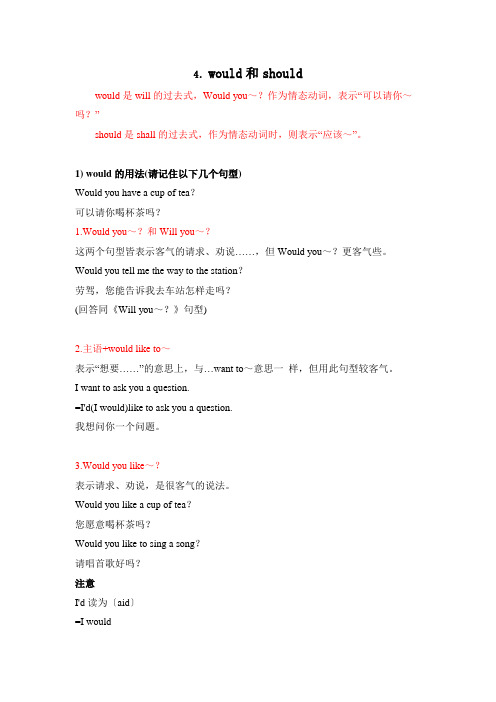
4.would和shouldwould是will的过去式,Would you~?作为情态动词,表示“可以请你~吗?”should是shall的过去式,作为情态动词时,则表示“应该~”。
1) would的用法(请记住以下几个句型)Would you have a cup of tea?可以请你喝杯茶吗?1.Would you~?和Will you~?这两个句型皆表示客气的请求、劝说……,但Would you~?更客气些。
Would you tell me the way to the station?劳驾,您能告诉我去车站怎样走吗?(回答同《Will you~?》句型)2.主语+would like to~表示“想要……”的意思上,与…want to~意思一样,但用此句型较客气。
I want to ask you a question.=I'd(I would)like to ask you a question.我想问你一个问题。
3.Would you like~?表示请求、劝说,是很客气的说法。
Would you like a cup of tea?您愿意喝杯茶吗?Would you like to sing a song?请唱首歌好吗?注意I'd读为〔aid〕=I would=I should=I had2) should的用法You should read this book.你应该读这本书。
1.should(应当、应该)用于所有人称,与ought to~同义。
You should wait a little more.=You ought to wait a little more.你应该再多等一会儿。
2.在表示要求、命令时,语气是由should(应该)、~had better(最好)、~must(必须)逐渐加强。
had betterhad better相当于一个助动词,它后面要跟动词原形;had better只有一种形式,没有has,have better这一形式;它的否定式是在它后面加not。
小升初英语情态动词练习题及答案及解析

2.To my joy, we_________ go to the bank. Mary has lent us some money.
A.shouldn’tB.needn’tC.couldn’tD.wouldn’t
—No, you ________. Don’t you see the light is still red?
A.couldn’tB.wouldn’tC.mustn’tD.needn’t
5.—The high school entrance examination is coming!
— Yes, our teacher tells us we ________ be too careful while taking exams.
—Nothing________be better.
A.shouldB.couldC.mustD.may
18.— Ready? Let’s get started, Martin.
— Swimming? I just ________ get used to it in winter.
8.Our Chemistry teacher always tells us we ________ be too hardworking before the exams.
A.mustn’tB.shouldn’tC.needn’tD.can’t
9.—Is it really necessary for me to go shopping with a mask on?
—Oh. You ________. He has known it already.
- 1、下载文档前请自行甄别文档内容的完整性,平台不提供额外的编辑、内容补充、找答案等附加服务。
- 2、"仅部分预览"的文档,不可在线预览部分如存在完整性等问题,可反馈申请退款(可完整预览的文档不适用该条件!)。
- 3、如文档侵犯您的权益,请联系客服反馈,我们会尽快为您处理(人工客服工作时间:9:00-18:30)。
小升初英语情态动词——should
Should表示"劝告"、 "建议 "时
这时should常译作 "应当"。
如:
We Should learn about the computer and make full use of it.我们应该了解计算机并加以充分利用。
You should listen to the doctor's advice.你应当听大夫的话。
You should study the article care fully. 你应当细,心学习这篇文章。
should还可以表示 "预测"、"可能"
They should be here by now.他们现在可能到了。
The reference book should be in the reading-room.这本参考书可能在阅览室里。
should有时表示说话人的感情如惊奇、愤怒、失望等
Why should I go? 我干吗要去?(不满)
I am sorry that he Should be so obstinate.我很遗憾,他竟这样固执。
(失望)
It's strange that it should be so hot today.很怪,今天怎么这么热。
(惊奇)
should后跟动词的完成式时
这时句子指的是过去的事情。
如果是肯定句,常说明某件事本应完成而未完成;如果是否定句,表示发生了不应当发生的事情。
如:
You should have stopped at in red light. 你见了红灯本应该停车。
You Should not have gone back to work without the doctor's permission.你不应当未经医生许可就回去工作。
He Should have come earlier. 他应早一点来。
